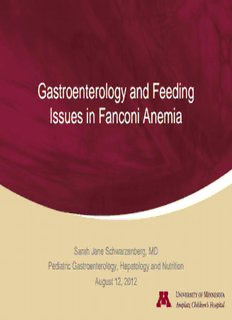
Gastroenterology and Feeding Issues in Fanconi Anemia PDF
Preview Gastroenterology and Feeding Issues in Fanconi Anemia
Gastroenterology and Feeding Issues in Fanconi Anemia Sarah Jane Schwarzenberg, MD Pediatric Gastroenterology, Hepatology and Nutrition August 12, 2012 GI problems in FA • 5% have gastrointestinal tract abnormalities • Common gastrointestinal issues – Poor oral intake – Nausea – Abdominal pain – Diarrhea • Liver adenomas associated with androgen treatment • Complications of stem cell transplant • Optimal nutrition in FA Consider most significant problem • Abdominal pain? – Location – Inciting agents • Nausea and vomiting? – Time of day – Association with drugs or food • Excessive gas? A simple symptom diary for 1-3 months may help with diagnosis Some conditions causing GI symptoms • Complications of anatomic gastrointestinal abnormalities – Strictures – Obstructions • Chronic inflammation/infection – Diarrheal disease – Small bowel overgrowth • Medication side effects • Neurologic/behavioral problems Gastroesophageal reflux • Commonly associated with esophageal atresia • Reflux may become more common with age • Medical management is essential to reduce complications • Many require anti-reflux surgery Symptoms of GER • Heartburn • Abdominal pain • Excessive burping, hiccuping • Poor appetite, vomiting • Poor sleep, nightmares Small bowel overgrowth • Proliferation of bacteria in the small intestine • Bacteria in small intestine may be changed by antibiotic therapy • Risk increased after previous gastrointestinal surgery • Associated with stasis – Impaired peristalsis – Abnormal anatomy – Blind loop Symptoms of SBO • Excessive bowel gas • Anemia • Diarrhea • B12 deficiency • Steatorrhea • Malabsorption • Bloating • Weight loss/Failure to gain weight • Abdominal pain Evaluation of gastrointestinal symptoms • Good history and physical exam • Diagnostic testing possibilities based on history and physical exam – Blood for CRP, ESR – Stool for ova and parasites, giardia, cryptosporidium, other pathogens – Urine culture – Hydrogen breath tests – Endoscopy with biopsy – Avoid radiographic imaging, if possible • Ultrasound and MRI are safe Alarm symptoms and signs • Involuntary weight loss • Deceleration of linear growth • Gastrointestinal blood loss • Significant vomiting • Chronic severe diarrhea • Unexplained fever • Persistent right upper or right lower quadrant pain • Family history of inflammatory bowel disease
Description: